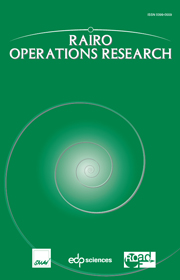Article contents
Semidefinite Programming BasedAlgorithms for the Sparsest Cut Problem
Published online by Cambridge University Press: 17 June 2011
Abstract
In this paper we analyze a known relaxation for the Sparsest Cut problem based on positive semidefinite constraints, and we present a branch and bound algorithm and heuristics based on this relaxation. The relaxed formulation and the algorithms were tested on small and moderate sized instances. It leads to values very close to the optimum solution values. The exact algorithm could obtain solutions for small and moderate sized instances, and the best heuristics obtained optimum or near optimum solutions for all testedinstances. The semidefinite relaxation gives a lower bound $\frac{C}{W}$ and each heuristic produces a cut S with a ratio $\frac{c_S}{w_S}$
and each heuristic produces a cut S with a ratio $\frac{c_S}{w_S}$ , where either cS is at most a factor of C or wS is at least a factor of W. We solved the semidefinite relaxation using a semi-infinite cut generation with a commercial linear programming package adapted to the sparsest cut problem. We showed that the proposed strategy leads to a better performance compared to the use of a known semidefinite programming solver.
, where either cS is at most a factor of C or wS is at least a factor of W. We solved the semidefinite relaxation using a semi-infinite cut generation with a commercial linear programming package adapted to the sparsest cut problem. We showed that the proposed strategy leads to a better performance compared to the use of a known semidefinite programming solver.
Information
- Type
- Research Article
- Information
- Copyright
- © EDP Sciences, ROADEF, SMAI, 2011
References
- 1
- Cited by

